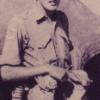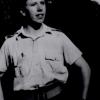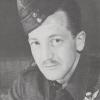It was a very typical wartime wedding. No long white veils or pretty bridesmaids encumbered us. Sadly, due to tight security all photographs were prohibited, and Myles was not allowed to wear his beret or Parachute Regiment wings. My wedding gown was a powder-blue woollen frock, and my greatest extravagance a pair of high-heeled shoes which consumed my last remaining clothing coupons.
We were married twice, because of our different religious denominations and in order not to offend our relatives. The first time at the Marylebone registry office, which my father-in-law attended, and the second time in St James's, Piccadilly.
No place of worship could have been more eminently suitable. Completed in 1684, the sloping steeple the only part which was not designed by Wren, it stands serenely between Jermyn Street and Piccadilly, where in the heat of summer pedestrians are shaded by the leaves of a gnarled old tree protruding from the churchyard. Damaged during the Blitz by high explosives and incendiary bombs, in 1943 only the south aisle remained intact. A tiny chapel sufficient for our needs. The wall behind the altar was scarred, the hard wooden pews were charred, and the prayer books were singed and stained.
No floral arrangements relieved the stark splendour of this noble church, and my wedding bouquet was the last of some fragile miniature orchids that, on his way from Sussex, Myles had persuaded an orchid grower to part with. As the seventeenth-century organ with gilded angels by Grinling Gibbons was not in use, a wheezy harmonium accompanied the voices of the congregation, which consisted of our nearest relations, including Bryan's and Myles's grandmother, and his best man, Leslie Kiaer. Of Norwegian extraction, with blue eyes and ash-blond hair, Leslie shared a unique friendship with Myles. One that is often found between brothers-at-arms who have braved many dangers together. They also shared a similar sense of humour, an avid curiosity about life, and firm opinions. But the faint, wintry sun valiantly penetrated the windows covered by yellowing cellophane, the old stone walls emitted the calm of centuries of prayer, and in all the two hundred and fifty-nine years during which marriages had been solemnised at St James's, I am reasonably certain it never contained two more joyous, devoted participants.
In contrast to these deeply moving, simple services, our reception, held at Brown's Hotel in Dover Street, turned out to be a boisterous affair. Effie, the staunch little Morris Minor, was our bridal carriage, and my new father-in-law accompanied us there, squeezing his massive frame in beside the bridegroom whilst the bride perched exultantly in the back. There had been no time to issue written invitations, and we were amazed, upon entering the room, to see so many of our friends assembled. VADs, FANYs and, of course, the Parachute Regiment were there in force, as well as several people in reserved occupations. Somehow my parents had managed to procure an almost limitless amount of liquor, which, although unrationed, was not easy to obtain.
The hilarious disaster of our wedding cake was the responsibility of the caterers. Reposing in all its tiered and ornate glory on a silver stand, nobody noticed that the entire edifice was made of cardboard. Until the waiter simply lifted it off' Revealing, to a roar of applause, a pale, crumbling substance parsimoniously scattered with diminutive currants.
Had it even been suspected that Myles would return to England at this stage of the war, there is no doubt that some rationed ingredients would have been set aside, but in the circumstances our wedding cake poignantly symbolised the paucity of provisions reaching Britain's shores through mine-filled seas.
The hours passed in a daze, speeches were made, and then we departed for the first few days of our honeymoon at the Savoy, in a room with a wonderful view overlooking the Thames. An audacious, luxurious episode bearing no relation to the war at all. Apart from one mirthful reminder of Myles's past which asserted itself defiantly.
Effie, small and slightly shabby, was driven into the forecourt of the Savoy with all the panache accorded to the Rolls-Royces and Daimlers usually associated with that bastion of the Establishment. Our luggage was duly deposited in the back, and we prepared to drive off. ‘A moment, sir!’ The dignified, much bemedalled custodian of that internationally renowned hotel stooped, and without a change of mien, retrieved from the gutter a worn, pathetic, sponge-like creature by the name of Pluto, which had accompanied Myles in ablutions at school and throughout all his desert campaigns. One cannot help wondering whether distinguished visitors and 'pop stars' are still accorded that same courteously sensitive service. Or, perhaps, they prefer to disown such humble loyal belongings?
Almost speechless with laughter we drove through Trafalgar Square, up the Mall and west to the Cotswolds, where the remainder of our leave was spent at the Lygon Arms. At that time still a quaint old English inn. Few tourists had discovered it, no ugly extensions had been added, nor had central heating been installed; which made the Bridal Suite, which we inhabited, bitterly cold. What did that matter?
We walked the hills, we planned our future, and on New Year's Eve we joined the revellers briefly. Time stood still and we were filled with content.
For once authority was benevolent. Myles was sent on an intelligence course at Cambridge, and we lived in that glorious centre of learning until my compassionate leave expired, making a return to Swanborough inevitable. But not for long. It was soon proved that our great desire would be granted, as I was pregnant. Again my husband demonstrated unique qualities, because, determined that no child of his would start life in any but the best of available circumstances, he decided to extricate me from the Navy. Once more he bearded the top brass, this time a board of naval officers at the Admiralty, and to the amazement of all concerned except himself, I was released almost immediately.
A rather sad event occurred before I left. Whilst preparing the patients' trays in the kitchen and talking about my imminent egress, I was suddenly and hysterically attacked by another nurse wielding a large bread knife. Quickly disarmed by nearby friends, she refused to reveal the reason for her outburst, and some hours elapsed before we learned that this poor girl, usually very reticent, was also pregnant, but to a married man away at sea who refused to acknowledge his responsibility. My happy chattering had been the catalyst.
This episode subdued our delight when Myles came to fetch me away, but as we drove over the windswept Downs our spirits rose, and we celebrated at the Metropole Hotel in Brighton before returning to the battalion's Rutland retreat.
High on a hill, surrounded as far as the eye could see by snow-covered fields, stood a lonely pub. Howling gales had battered its grey stone walls for centuries, but inside the warmth of old-fashioned hospitality prevailed. For Myles and me it was the perfect billet as, being so small, it contained only two bedrooms. One for the landlord and his wife, and one for us. A diminutive chamber, almost entirely filled by the huge bed, whereon reposed a genuine goose-feather mattress, into which we sank as if on a billowing cloud.
Each morning, after my husband had departed to his duties, our solicitous landlady served me a vast breakfast in this feathery nest. Bacon, eggs and sausages! I could not believe my eyes. Were there no rationing problems in this remote countryside?
As evening approached I would wait for the sound of a jeep to roar up the road, bringing Myles home. After dinner we would be joined by cheery parachute officers around the blazing fire in the tiny saloon bar. Amongst them, if I remember rightly, was Lionel Queripel, who won a posthumous Victoria Cross, and others whose names would soon be legendary.
This saloon bar, which also acted as my sitting-room during the day, adjoined the public bar, where paratroopers sat on old oak settles nursing mugs of beer, their large frames filling the restricted space; and such was the camaraderie between these men that often bantering conversations flowed between both bars, roars of laughter filling the smoky rooms. I felt honoured to be accepted by these stalwarts, but, although I took long walks along the ice-glazed roads, I never discovered where their headquarters lay.
Come spring they moved near Ringway aerodrome, and I, perforce, went back to my parents' home, where a wing of the house, shut off due to wartime conditions, was put at our disposal and ambitiously termed 'the flatlet'.
Prior to the battalion's departure, however, a dance was held in their honour. It was a magical evening and although it is unmentioned in history, a place of gratitude must be held in many a heart for our host, who shall remain anonymous. A hard-headed, shrewd, business tycoon no doubt he was, and perhaps a little superstitious too, because his daughter, named Fortune, was never permitted to be addressed as 'Miss Fortune'. Who but a man of indomitable spirit would have dared, or had the resources at that stage of the war, to Invite the officers of a whole battalion and their partners to such an event? Black tie or uniform was the dress of the day and my mother lent me a pre-war apple-green ball dress which bared my shoulders but discreetly camouflaged my increasing girth.
Together with our erstwhile hostess and her husband, safely returned by now from the Middle East, we piled joyously into their veteran car and arrived at a mansion brimming with hospitality. A band played during supper and, emboldened by the vigorous antics of the parachutists, continued until dawn. Myles and I danced unashamedly together throughout, except when some of his nearest friends dared to intervene. According to a local matron, 'If I hadn't been told that those two were newly married it is obvious simply by looking at them both.'
Spring was in the air. The sap was rising in the budding trees. We left those intrepid young bachelors to their amorous designs, unaware that all too soon they would be tragically curtailed, and drove away through a dew-washed world to the clamorous melodies of a blithe dawn chorus.
******
On Sunday, September 17th, 1944, the Battle of Arnhem began, and raged for seven days.
‘... with no reinforcements save the wounded, who, if their legs would still bear them, staggered back to the firing line, they fought on. With an enemy growing ever stronger, pressing against them on all sides but one — and that a wide, swiftly flowing river — they fought on. When no hope of victory remained, when all prospect of survival had vanished, when death alone could give them ease, they fought on. In attack most daring, in defence most cunning, in endurance most steadfast, they performed a feat of arms which will be remembered and recounted as long as the virtues of courage and resolution have power to move the hearts of men. They are, in fact, men apart. Every man an Emperor.’
So spoke Field Marshal Sir Bernard Montgomery.
Graphic descriptions filtered through the wireless. Days merged into nights and, mercifully, memory only retains the few calm afternoons spent with Annie, her baby daughter and her mother, away from my anxiety-ridden parents and our flatlet.
On September 29th a telegram was received. 'Missing. Believed Killed.' My labour pains started shortly afterwards.
We had previously made arrangements that the owner of a local garage, who was permitted extra petrol, should drive me to the nursing home some twenty miles away, so on a hot and sunny afternoon Albert Sivyer and I drove off. Twenty-four hours later a V2 exploded in the vicinity, but did no damage to the building we were in, and our daughter made her entrance into the world unharmed. My mainstay and comfort even from that moment, as the inevitable physical pain of her birth helped to alleviate the mental anguish, which was harder to bear. It was also, fortuitously, too late for her to be affected by the strangely vivid scenes of flaming buildings and bloody battles which filled my mind during those long hours.
My father registered her birth, but here a problem arose. We had decided that if our baby should be a girl we would call her Carolyn or Anne, but I didn't know which name Myles would prefer. 'Put down both,' I said. 'When he comes back we'll decide.' Upon reading a posthumous letter fifty years later his decision became very clear.
Months passed. My baby needed an operation in a London hospital, and this was superbly achieved by an elderly, white-haired surgeon who had come out of retirement for the duration. I ran between the hospital and the Red Cross Centre searching for news of prisoners-of-war, and went a little mad. Insisting, among other incongruities, on attending an Arnhem memorial service alone and in a scarlet coat. Only now, whilst writing these lines, do I realise that it might have given offence to the more conservative bereaved. That coat was Myles's favourite garment. What else mattered?
My parents, and more particularly my parents-in-law, were wonderful. Aching themselves, and less optimistic than I, they surrounded their first grandchild and me with total consideration and concern. We stayed at Bridgelands for long periods, and here I found some unexpected support. Webb, whom I have mentioned earlier, and am ashamed to admit know by no other name, was the epitome of that obsolete stock, the family retainer. Working up from boot-boy in his early teens, he eventually became a butler in the house of Rothschild, where, being the intelligent man he was, he caught many a hint on how to invest his hard-earned savings. By the time I met him he was advanced in years, acting as valet and faithful friend to my father-in-law, as well as performing other duties caused by depleted staff. Due to the 'upstairs downstairs' influence of those times, the families of his employers seldom acquainted themselves with the more mundane details of their kitchens, least of all in the early hours of the morning and in their dressing-gowns! But I could not sleep, neither could Webb, for different reasons, and at six o'clock my baby required her feed.
At the first light of dawn I would patter down to the kitchen and, although at first he objected when I prepared the tea, considering that was his prerogative, he soon became accustomed to it. We would sit together at the kitchen table, the big, brown pot steaming between us, and as the early rays of the sun glinted through the latticed window panes, this wise old man generously shared his wide experiences and philosophies. Then I would bring the baby down, to the old gentleman's great delight. The constraint of years of service fell away, and he revealed a boyishness that must have stemmed from his early Cockney childhood. Devoted to Myles, these early morning hours playing with his daughter perhaps helped to assuage the sorrow that Webb felt. I know that his wisdom and his comforting presence gave me strength to face the following day.
On May 8th, 1945, hostilities in Europe ceased. The country celebrated. Unwilling to appear indifferent I joined friends in a local pub. The Paras' panacea for all ills was to get drunk. I did. Together with a lady who had lost her only son. Having failed to get any reply from the Red Cross about prisoners-of-war, I started to question parachutists who had escaped. Company Sergeant-Major Grainger was a brave man, who together with all his other medals, deserved one for his courage in telling me the truth. Myles had been mortally wounded whilst rescuing one of his men. Severely injured himself, this CSM had gone for help, but by then the Germans had recaptured the area. He knew no more, and I remained optimistic. Never was I officially notified that Myles had died of wounds, and this is one of the hidden horrors of war; that if there is no tangible evidence of death, hope springs eternal. All cultures recognise the importance of funereal farewells, except in war, and with thousands of others all over the world, then as now, I never gave up hope. Throughout the days and nights, throughout the years that followed. And now, as life draws to its inevitable close, my destiny fulfilled, that hope grows stronger.
A poem, written during the Siege of Stalingrad, says all.
WAIT FOR ME
Wait for me - I will come back. Only wait ... and wait. Wait though rainclouds louring black Make you desolate; Wait though winter snowstorms whirl, Wait though summer's hot; Wait though no one else will wait And the past forgot Wait though from the distant front Not one letter comes; Wait though everyone who waits Sick of it becomes. Wait for me - I will come back. Pay no heed to those Who'll so glibly tell you that It is vain to wait. Though my mother and my son Think that I am gone, Though my friends abandon hope And back there at home Rise and toast my memory, Wrapped in silence pained, Wait. And when they drink their toast Leave your glass undrained. Wait for me - I will come back Though from Death's own jaws. Let the friends who did not wait Think it chance, no more They will never understand Those who did not wait How it was YOUR WAITING that Saved me in the war. And the reason I've come through We shall know, we two Simply this: you waited as No one else could do.1But how many people are blessed with a loving relationship that never mars? And how many people alive today have not, at one time or another, been disillusioned by their loved one's faults? Time spared us that. Our illusions remain eternally intact.
This extract from Chapter 8 of ‘I’ve Had My Dance’ is reproduced by kind permission of the author Pamela Morris.
Compiled for ParaData by Harvey Grenville
1Wait For Me by Konstantin Simonov, (Trans.) Alan Moray Williams, c. 1944.
Reproduced by kind permission of the author Pamela Morris, compiled for ParaData by Harvey Grenville
Source: Pamela Morris, I've Had My Dance (1996) Erica Press.
Read More




Latest Comments
There are currently no comments for this content.
Add Comment
In order to add comments you must be registered with ParaData.
If you are currently a ParaData member please login.
If you are not currently a ParaData member but wish to get involved please register.